

National UN Volunteer in health and nutrition, Yuly Enith Gómez Calvache, supports UNICEF in early childhood development activities in Colombia.
© Josué Mejía Cuartas / UNICEF, 2019
Financial arrangements for UN Volunteer assignment
Who pays for the UN Volunteer assignment?

On-site UN Volunteers
The UN partner hosting an on-site UN Volunteer covers the cost of a UN Volunteer assignment. The cost varies depending on the volunteer category selected, which you can refer to in the overview of proforma costs for UN Volunteers.

Fully funded UN Volunteers
UNV also has a limited number of UN Volunteer assignments that are fully funded by donors and allocated in close consultation with the Member State. UNV is the main interlocutor for UN entity partners hosting a UN Volunteer sponsored by a UNV funding partner.The main entry point for UN entities to discuss the possibility to host a sponsored UN Volunteer is the UNV Field Unit, or, for countries without a UNV presence, the respective UNV Regional Office.

Online Volunteers
The Online Volunteering service is free of charge to all eligible partners, effective 1 January 2020. This is made possible through process efficiency measures put in place in 2019 such as the digital transformation project and mainstreaming of the OV service into respective sections’ mandates and functions.
What is the Service Clearing Account (SCA)?
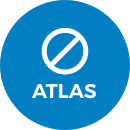
Established for the “Non-Atlas Agencies”
For UN entities who do not use Atlas (ERP), a dedicated Service Clearing Account (SCA) is established for each UN entity.
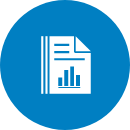
Transactions and Services Reporting Method
A method developed allowing transactions to be reported between two UN Host Entities. An official report is pulled out of Atlas every month and provided to the UN Host Entities for their review and reconciliation.
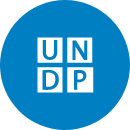
Managed by UNDP
The SCA is managed by UNDP, so the UN Host Entities will see charges from both UNDP and UNV in the monthly SCA reports.
• SCA acts like a bank account.
• UNV is able to initiate identification of candidates and recruitment of UN Volunteers only upon receipt of a financial authorization from UN Host Entities.
• Until UNV has a Financial Authorization, no UN Volunteer transactions should be charged against the SCA account of a UN Host Entity.
• When the UN Host Entity transfers funds, into the UNDP SCA bank account, is an internal decision for the UN Entity, depending on their internal SCA process.
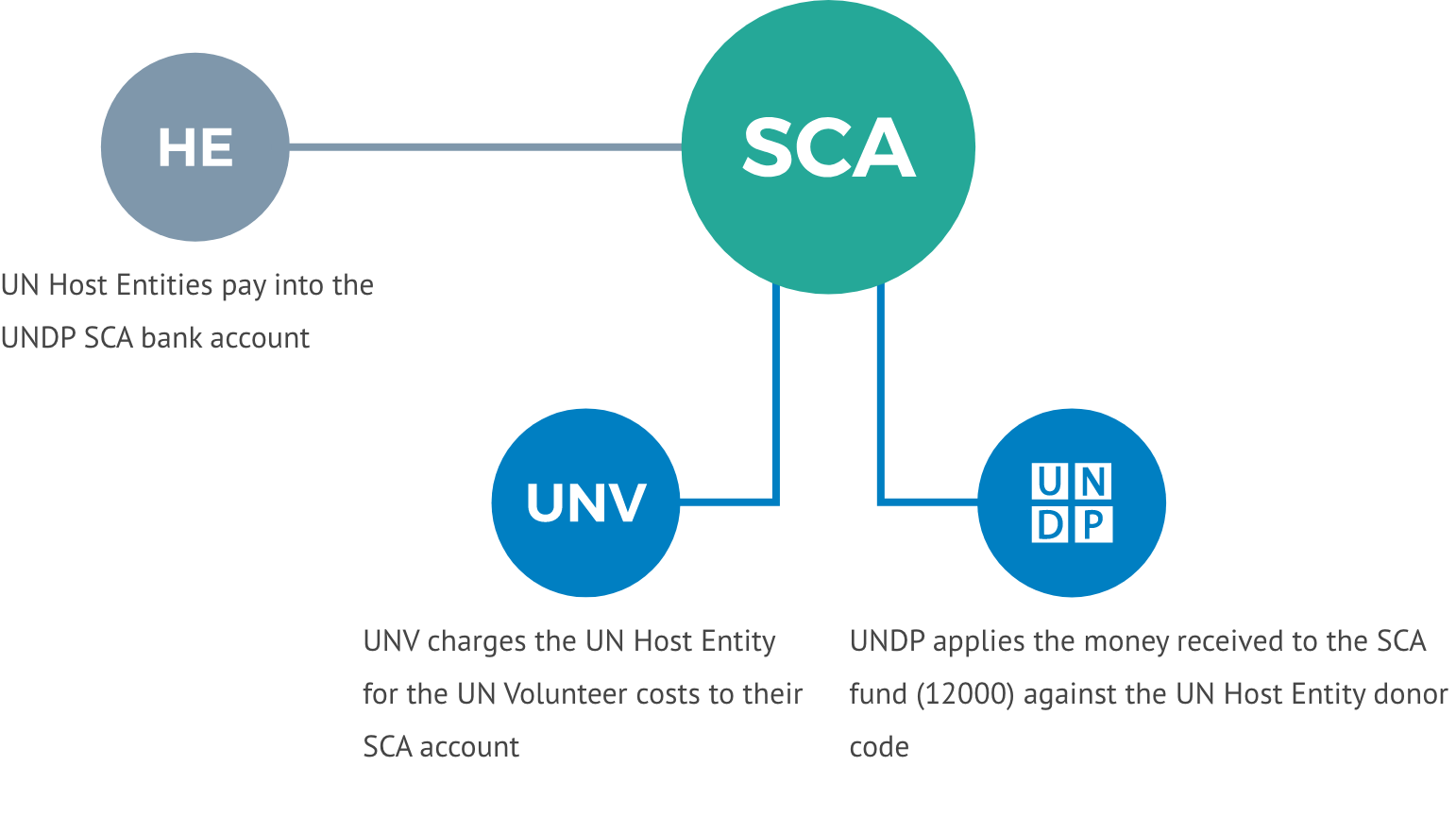
How to Pay and Replenish Specific Host Entity SCA?

It is the responsibility of the UN Entity to ensure their SCA has sufficient funds available.

No transfers to local bank accounts.

All payments and replenishments reflect in the monthly SCA report.
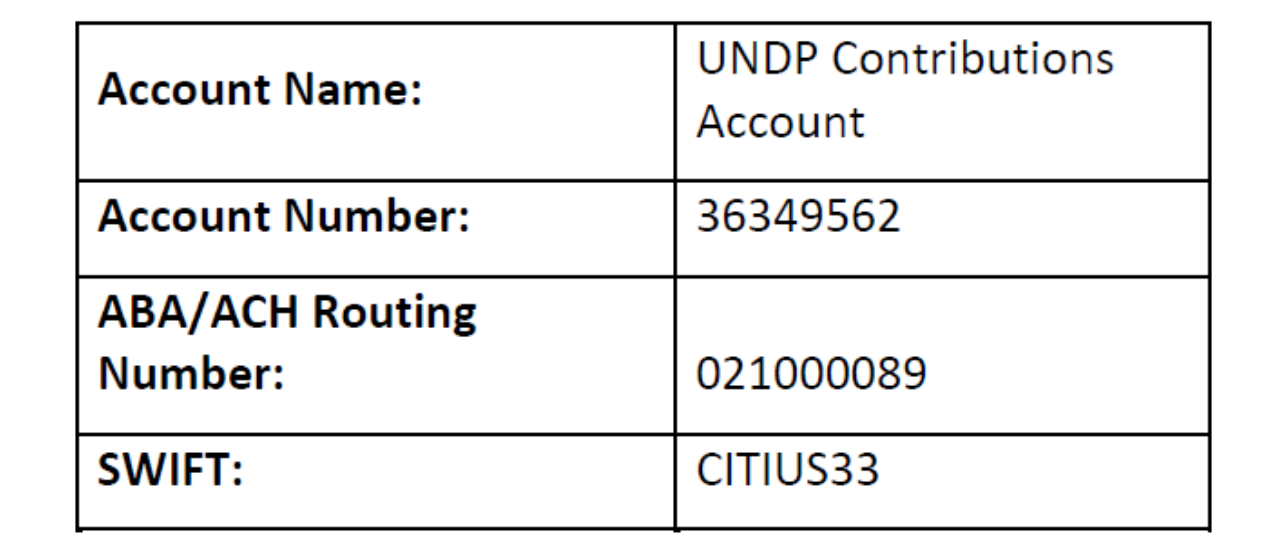
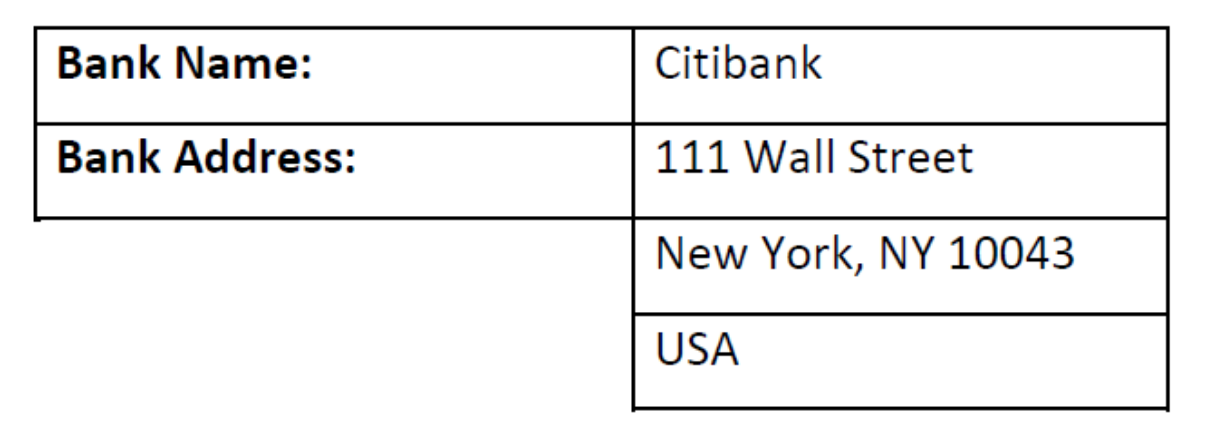
Can the UN Entity Transfer the Full Contract Amount to UNV?
The answer is yes and no.
The UN Entity can transfer as much as they like to the SCA, UNV has no say in this.
UNV cannot expense the volunteer costs in one report.
Why not?
☐ As per IPSAS (international accounting standards) and UNDP Financial Rules and Regulations, expenses are recognized only after goods or services have been rendered or received.
☐ No way to pay the volunteer a lumpsum in advance, we pay them after the month has been worked.
☐ Most, if not all UN Entities follow IPSAS rules as well.
☐ Applies to ATLAS Agencies too.
Here you can find detailed guidance on the general process, UNV requirements, the standard UNDP SCA bank account for Host Entities and the standard chart of accounts for SCA related charges:
When and how does a host entity provide financial authorization?

UN Host Entity inquires about recruiting or extending a UN Volunteer

UNV provides the proforma cost estimate (See tab on "Proforma costs for UN Volunteers" above.)

UN Host Entity officially requests to recruit a UN Volunteer by submitting a Description of Assignment (DoA) and financial authorization. Please consult your HR / Finance section for guidance on internal financial approval process.

A financial authorization (FA) should either be;
• an UMOJA FA (for entities using UMOJA) or,
• the UNV Service Request Form for non-UMOJA entities, or,
• an official entity specific financial authorization meeting UNV FA requirements.

UN missions follow a pre-established workflow for financial authorizations. Count on our UNV Field Office for support, they have your back.
What is a Financial Authorization (FA)?

The authorization should cover the costs for the full contract period – including contracts that spread over multiple years – based on the proforma cost estimate.

If a UN Entity cannot provide an FA over multiple years the contract can only be generated to the end of the period reflecting in the FA.

UN Volunteers cannot be recruited, nor charges incurred, without a Financial Authorization! Be it for the initial contract or for the extension.

In case of extension, contract can only be generated once the FA for the next period is submitted to UNV.

See guide for detailed information on what a financial authorization should include.
Service Request Form (Financial authorization for recruitment and extension)
(only for UN Agencies not using UMOJA)
- The first page is for non-Atlas Agencies – UNHCR, WFP, UNICEF, etc.
- The second page is ONLY for Atlas Agencies – UN Women, UNFPA, UNCDF, UNITAR and UNDP
Where to access the report on UN Volunteer expenses?
Follow the guidance below to access the report on volunteer expense information charged to host entities:
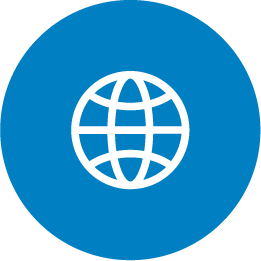
The official SCA reports are uploaded on a monthly basis at this link.

If the respective colleagues in the host entity do not have access to the above site, please either contact the SCA focal point within the Host Entity or contact gssu.agencies@undp.org for access.

If it is unclear how the host entity treats the monthly SCA report entries, please get in contact with your SCA focal points in order to request for guidance on internal processes within the host entity.
Information

All fund transfers to UNDP/UNV as well as all expenditures charged to the host entity will reflect in the monthly SCA report.

The host entity should review and reconcile the SCA balances on a regular basis and record the respective expenditures in their financial system.

The SCA report is broken down by volunteer country of service and expense category - down to the transactional level. This makes it easy for host entities to identify the charges for each of their volunteers.

UNV is not responsible for providing or reconciling the SCA report for host entities.
What elements are included in the proforma costs?
UNV’s proforma costs include UNV’s cost recovery mechanism, which follows a three-tiered methodology, applied to all UN partners volunteer management costs, as follows:
- A one-time Deployment Charge: This charge recovers the onboarding costs for deploying UN Volunteers and the related UNV internal workload attribution, independent of the volunteer contract duration.
- Recurring Charge: This is a percentage charge (13%), applied monthly, to recover the recurring maintenance cost for administering UN Volunteers, UNV staffing and other related costs incurred for volunteer contracts and entitlements management and support.
- Country Office Support Cost: This is a monthly percentage change (2.5%) to cover the cost of transactions performed in the UNDP country offices towards recruitment, deployment and administration of UN Volunteers. The amount collected is fully distributed to UNDP Country Offices once a year.
What are the allowances and entitlements of UN Volunteers in the proforma costs?
The proforma cost estimates that UNV shares with UN partner COs upon request are structured in three parts:
- Volunteer Entitlements include (as per the applicable COS): Monthly Living Allowance, Family Allowance, Settling-in-Grant (SIG), Well-being differential and Resettlement Allowance.
- Volunteer Assignment Costs include (as per the applicable COS): Insurance, Learning, Travel and Sundries.
- UNV Volunteer Managements costs include: the [one-time] Volunteer Deployment Charge, Recurring Charge and the Country Office Support Cost as explained in the above question on cost-recovery charges for onsite UN Volunteers:
The “take home” pay for the UN Volunteers is primarily the Monthly Living Allowance (MLA). One does, however, need to take into consideration the overall package of MLA, other entitlements as well as travel (pre-departure entitlements, assignment and repatriation travel lumpsums), family, resettlement, learning allowances and programmes, insurances and medical/security evacuation coverage.
Proforma elements guide for agency partners

Volunteer Entitlements
The monthly allowance is intended to meet basic living costs. It should not be considered a salary.
For international UN Volunteers, MLA is calculated by multiplying a base rate (established by UNV) by the Post Adjustment Multiplier (PAM). PAM is set by the International Civil Service Commission (ICSC) for each duty station.
For national UN Volunteers, MLA is aligned to local conditions. Rates are established and updated based on surveys conducted by the ICSC. Rates are normally benchmarked to the annual total net salary of locally-recruited UN personnel at GS-2, Step 6. They may be adjusted at the request of the UN Country Team and/or Resident Coordinator, with the approval of the UNV Regional Manager.
UN Youth, UN University and UN Community Volunteer rates are 80%, 60% and 40% of the UN Volunteer specialist rate, respectively. UN Expert Volunteers receive a 40% experience differential in addition to the UN Volunteer specialist rate.
A one-time, lump sum to help eligible UN Volunteers buy basic household items and cover other one-time expenses that are typically incurred in moving and setting up a new residence. This includes additional costs of temporary accommodation and other living expenses in the early days after arrival. Settling-in-grant is calculated as a proportion of MLA, depending on the volunteer modality and length of assignment (maximum 2 x MLA).
All international UN Volunteers are eligible, as are national UN Volunteers who are recruited outside of commuting distance from their duty station.
Additional SIG is paid to eligible international UN Volunteers if dependants join them at the duty station.
International UN Volunteer specialists or UN Expert Volunteers who are supporting recognized dependants receive a family allowance in addition to their MLA. There are monthly, flat rates for:
-
one dependant;
-
two or more dependants;
Dependants are either a spouse or unmarried children under 21 years old.
Dependants do not need to be present at the duty station for the UN Volunteer to receive family allowance.
Recognizes added health, security, climate, and psychological burdens faced by UN Volunteers serving in non-family duty stations, where living conditions are substantially below conditions in family-duty stations. There are two rates, depending on criteria set by UNV which is based on ICSC classification.
The UN Country Team or Resident Coordinator may request UNV to apply an exceptional WBD in locations that are not eligible according to ICSC classification, if justified by local conditions.
A lump-sum to help UN Volunteers re-establish themselves professionally and personally after their assignment ends.

Volunteer Assignment Costs
For the initial and repatriation travel of international UN Volunteers, a standard amount is charged and flows into a central fund, regardless of actual travel costs. The amount charged depends on the volunteer category.
For eligible assignments, an amount is charged monthly for home visit travel. Home visit allows international UN Volunteers and their dependents to travel home to rest and to renew personal, cultural and professional ties in the home country.
International UN Volunteers receive a standard amount for pre-departure expenses and shipment of personal effects to and from their assignment duty station.
National UN Volunteers, receive a one-time payment at the beginning of the assignment to cover the costs of a medical examination.
National UN Volunteers may also claim costs for travel and moving costs, but these are paid (and charged to the host entity) only if the volunteer lives outside of commuting distance to the duty station and costs are claimed by the UN Volunteer.
Charged at a rate of either 4% or 6% of MLA, depending on the duty station for assignments with UNDP/UNV or UNCDF for UNDP to meet its security obligations.
The training and learning charge contributes to a central fund to cover free access for UN Volunteers to UNV’s online learning platform, and an individual learning and training allowance paid to volunteers on request. It also covers the cost of maintaining UNV’s internal capacity to deliver the volunteer learning platform and group learning.
An additional charge is applied for UN Youth Volunteers to pay for assignment preparation training.
UN Community Volunteers receive a one-time payment for learning at the start of their assignment, unless this amount is utilized by the host entity for group training activities. UN Community Volunteers are not eligible to apply for additional learning allowance.
Sundry includes a monthly contribution to a central fund to cover potential medical evacuation.
A monthly charge is also applied per volunteer to cover costs incurred for medical services provided by the UN Office in Geneva. Services include medical clearance, approval of medical evacuation and certification of long-term sick leave.
Sundry also includes a standard monthly charge, per volunteer to enable UNV Regional Officers and Field Unit personnel to travel for monitoring of conditions of service implementation in the field.
Residential security costs when incurred are charged directly to the project/host UN agency at actual cost. There are two types of costs for which host entities need to budget:
(1) costs dependent upon the duty station for implementing Residential Security Measures (RSMs).
(2) any possible security relocation/evacuation related charges. For international UN Volunteers this includes compensation for loss of personal effects due to war, civil unrest or natural disaster.
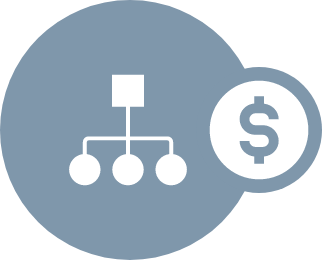
Volunteer Management Costs
A one-time, fixed amount charged at the beginning of the assignment to recover costs expended by UNV to:
-
Develop partnerships and manage the assignment pipeline
-
Manage the UNV talent pool, conduct outreach, source and assess candidates
-
Identify, select and recruit candidates and onboard UN Volunteers and their dependants
-
Close assignments and repatriate UN Volunteers and their dependants
Paid to UNDP country offices for UNDP infrastructure support with UN Volunteer recruitment, deployment and administration as per the agreement between UNV and UNDP Bureau of Management services (BMS). This is not applicable to assignments with UN Peace Operations, as these provide the needed infrastructure, including personnel.
A monthly charge to recover costs expended by UNV to manage contracts and entitlements and provide ongoing support for UN Volunteers including:
-
UNV premises
-
UNDP corporate fees
-
UNDP legal services
-
UNV personnel
-
Payroll and banking information services provided by the Global Shared Services Unit (GSSU) in Kuala Lumpur and Copenhagen
-
Information technology (IT) equipment purchase and maintenance and IT services
-
Communications and advocacy
Encompasses general oversight and management functions of UNV/UNDP and includes receipt, allocation and reporting to the donor of financial resources; branding, knowledge transfer; leadership and representation; programme direction and accountability; operations management and administration.
GMS is charged at a negotiated rate as a percentage of all costs associated with UN Volunteer deployment and management.

Additional Entitlements
International UN Volunteers serving in duty stations where local rental markets are distorted due to temporary extenuating factors may apply for extra allowance to meet the costs of rent. Upon request from the host entity, the accommodation supplement may be applied duty-station wide.
Proforma Costs for UN Volunteers
Proforma Cost Overview 2021 for national and international UN Volunteer assignment
(including UN Community Volunteers)
Online Volunteering service pricing
The Online Volunteering service is free of charge to all eligible partners, effective 1 January 2020. This is made possible through process efficiency measures put in place in 2019 such as the digital transformation project and mainstreaming of the OV service into respective sections’ mandates and functions.
(only for UN Agencies not using UMOJA)
- The first page is for non-Atlas Agencies – UNHCR, WFP, UNICEF, etc.
- The second page is ONLY for Atlas Agencies – UN Women, UNFPA, UNCDF and UNDP









